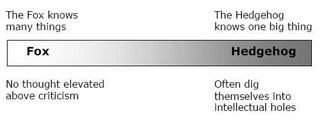Blog
Subscribe
Join over 5,000 people who receive the Anecdotally newsletter—and receive our free ebook Character Trumps Credentials.
Categories
- Anecdotes
- Business storytelling
- Collaboration
- Communication
- Corporate Storytelling
- Culture
- Decision-making
- Employee Engagement
- Events
- Fun
- Insight
- Leadership Posts
- News
- Podcast
- Selling
- Strategy
Archives
- April 2024
- March 2024
- December 2023
- November 2023
- October 2023
- September 2023
- August 2023
- July 2023
- June 2023
- May 2023
Years
Making better decisions in a complex world
A business that’s a hedgehog could go good to great, but a business full of hedgehogs could be a disaster. At least, that’s what I’m thinking after taking a look over Tetlock’s latest book on Expert Political Judgment – How good is it?
Tetlock used a spectrum model of hedgehogs and foxes to investigate the thinking styles of experts and how they make decisions. Suggesting that generally they have two extremes– the fox and the hedgehog, and there is a range of hybrids in between. I’ve summarised it in the figure below:

What I found particularly interesting is that in his research which has spanned over 2 decades and included 284 world experts, Tetlock has found that it is the Foxes that have got a leg up (so to speak) over the hard nosed hard ball hedgehog. Apparently Fox style experts are more likely to have a balanced style of thinking which helps them to better deal with a constantly changing complex world. Hedgehog style experts tend to dig themselves into their intellectual positions and have a real problem dealing with counter-evidence to their decisions.
Some tell-tale signs of a hedgehog being near by is that you might hear statements like:
- “I was almost right”
- “Yes, but”
- “I made the right mistake”
- “There was some bad luck in getting it wrong”
So what are you? A fox or a hedgehog?
About Andrew Rixon
Twitter •
Comments
Comments are closed.
Yes and it’s often not what is said but how. So “I was almost right” said in a humurous and self depreciating way means what? That I’m afox that had a hedgehog moment?
And can I swing from one classification to another as the need arises? In so doing if I am a fox and adopt hedgehog tactics because it suit the circumstances, what then? Oh boy……….. M
I see the philosophical conundrum you are pointing too. Snake eating its own tail and all…Or do I? 🙂
Funny, I was almost going to title the post, “It’s not what you know, but how you know it”….
I mean what you know 🙂
Off topic; I’ve been thinking about “knowledge management” and I think it could end up sullied. There is a fine line in most minds between management and manipulation. So is the corporation in its desire to make use of this repository of anecdotal corporate history going to manage, manipulate, coax and or force it out of the employees?
Is your personal knowledge of corporate history to be used to whose advantage; yours, the corporations, the communities, a comibination – depending on your contractual obligations and ethics?
Management is reductionist and controlling in nature; their motivation will always be questioned. Is KM just a case of getting more out of your employees, and under the current economic paradigm is this a common good?
Anyway if this is being discussed somewhere on this site or elsewhere, please point me there.
Thanks, M
Thanks!
A lot of questions there… Maybe mostly rhetorical?
As a starter have a look at a related post by Seth Godin: http://sethgodin.typepad.com/seths_blog/2005/11/welcome_to_the_.html